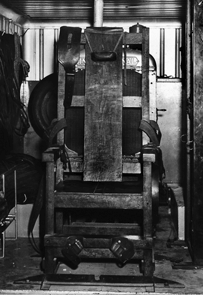|
 For this proud, grief-stricken father of thirteen children, who had sent one son, Adam Francis, off to fight for his nation in World War II, the state-planned execution of his youngest child was more than he could bear. Staring at the second-floor window of the room where Willie was awaiting a life-ending jolt of electricity, Frederick Francis continued to pace. For this proud, grief-stricken father of thirteen children, who had sent one son, Adam Francis, off to fight for his nation in World War II, the state-planned execution of his youngest child was more than he could bear. Staring at the second-floor window of the room where Willie was awaiting a life-ending jolt of electricity, Frederick Francis continued to pace.
The bells at Notre Dame de Perpetual Secours Church sounded at noon, their peal barely audible above the din of the generator. Willie’s time had come. Leaving the cell, Sheriff Resweber gave Willie a nod, and the boy followed him across the hall to the execution room and shuffled over to the chair. This time Resweber let him sit. Deputies approached. They removed the handcuffs and leg shackles. Willie’s dangling feet barely touched the floor.
The deputies began strapping Willie down, starting with his slender arms. Leather straps drew his biceps to his sides and secured them to the back of the chair. Straps fastened his wrists to the armrests. One thick strap seat-belted him tightly at the waist. One deputy ripped his left pant leg; another placed an electrode on his calf to improve conductivity once the current surged to Willie’s body.
Willie looked into the eyes of his red-faced executioner, Captain Ephie Foster, who stared back at him. Foster instructed the deputies to buckle the strap onto Willie’s left thigh. Everyone seemed to be buzzing around him. The deputies continued fastening, clipping, and buckling things. Willie broke into a sweat. The coldness he felt seemed to increase with the roar of the generator.
Willie was breathing hard. For several minutes in the small, cramped death room, the witnesses were still, as if they were waiting in silent, keen anticipation for that precise second on the clock to arrive when they could get to the part they had all come for. They stood about uncomfortably, saying nothing. Carrying a view camera mounted on a tripod, Father Rousseve stepped to the front of the room. Sheriff Resweber had consented to the portrait, so Rousseve adjusted the tripod, slipped his head under a dark cloth, and snapped a picture. Rousseve had photographed many of the couples who appeared before him on their wedding days, and he’d done portraits of countless children on the day of their First Holy Communion at the church across the street from the jail. Now he had just photographed one of his young parishioners strapped into Louisiana’s electric chair, his head slumped forward. “A beaten animal,” ready to accept his fate.
Captain Foster allowed Rousseve to finish. Behind him, George Etie, the one-armed owner of the Green Lantern and one of the New Iberians who had taken up Foster’s offer to see the nigger fry, stood against the rear wall of the room. Finally, Foster broke the silence. “OK,” he said, and with that, Sheriff Resweber stepped forward.
“Is there anything you’d like to say?” the sheriff asked.
Willie shook his head no. Resweber paused for a moment, in the event Willie might be gathering himself for a final statement. Father Rousseve again came forward, this time with a steel crucifix, which he pressed to Willie’s lips for him to “kiss the cross.” Then, along with the sheriff, Rousseve stepped to the back of the room. Another moment passed. A sudden movement behind him made Willie flinch. Someone pulled something, a hood, maybe, over Willie’s face; the leather mask caught him by surprise. Black and thick, it clung tightly to his face, although a small slit near his mouth made it possible for him to breathe. The man then tightened the gauze crown—soaked in water so that the electricity could travel unimpeded to Willie’s head—and secured it to the chair. Roughly, he attempted to gag Willie’s mouth with a leather band that he strapped to the back of the chair. Willie’s head banged back against the hard wood.
“It hurts me the way you’re doing it,” Willie mumbled.
“It’ll hurt more after a while, Willie,” Captain Foster replied.
Gagged with the leather band, Willie sat in darkness now, the deafening noise of the engine amplifying his terror. Father Hannigan had told him the chair wouldn’t hurt.
Captain Foster crouched over the electrical switchboard resting on the floor, another half-smoked, unlit cigar clamped between his lips. He was waiting for the generator to build to 2,500 volts, the level he wanted for delivering a powerful, fatal surge of electricity. When the needle on the switchboard finally indicated the machine was fully charged, Foster took one final glance at the black boy sitting in his chair.
Outside the jail, Frederick Francis was too agitated to take comfort from those who had gathered around him in support. Down the street at Notre Dame, black schoolchildren continued to pray alongside the nuns, the dull drone of the dynamo within their earshot. Perched on the branches of the giant oak, whites vied for a better view.
“Good-bye, Willie!” Captain Foster’s cruel voice boomed above the rattle of the chair’s noisy engine.
Willie, surprised by the captain’s farewell, tried to say good-bye. But his stutter and the leather band in his mouth prevented it. In a grandiose manner fit for the stage, Foster reached down and slowly pulled the switch.
|